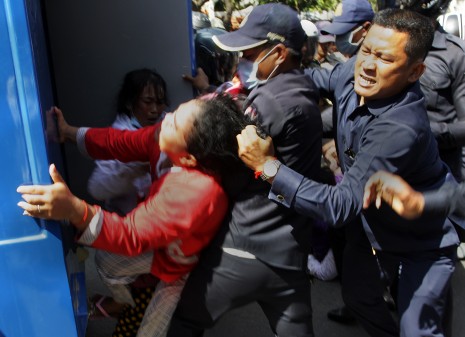When the government violently cleared Freedom Park of protesters on Saturday morning, sending in more than a hundred men armed with metal bars and wooden batons, it didn’t use the police.
When a group of five anti-eviction activists were dragged off the street Monday morning and bundled into a van and driven to the Phnom Penh municipal prison, it wasn’t the police either.
–News Analysis
And in October, when students, women and monks were assaulted while trying to hold a memorial service
for Mao Sok Chan, the 29-year-old bystander shot dead by police near Monivong Bridge, it wasn’t the police doing the pushing, shoving and punching.
In these cases and more, when brute force is needed, the government has turned to a group of mostly young men in tatty blue uniforms, wearing motorcycle helmets and wielding truncheons.
Prior to the recent months of protests, which have intensified following July’s disputed election, the blue-uniformed youths of Daun Penh district security were mostly needed for keeping people off the grass along the riverside and ensuring street vendors didn’t block traffic.
Now, they act as a street-level special forces unit, trucked in to violently shut down demonstrations, intimidate citizens, and, most recently, grab five women activists off Monivong Boulevard on Monday.
Although the official purpose of district security is to cut down on crime in communities in Phnom Penh, they have themselves become agents of fear.
“The deployment of district security guards to attack people must be investigated, and they must be brought to justice,” said Chan Soveth, head monitor for local rights group Adhoc.
“They are not properly trained in the law, and therefore have no judicial authority to carry out such measures.”
Though they wear uniforms of sorts, wield batons and operate under the full supervision of the government, district security guards are not officers of the law, said Sok Sam Oeun, a lawyer and head of the Cambodian Human Rights Action Committee.
“They think if they create this force and it is approved by the government, that it is an official force. But from a legal point of view, no law gives them any power,” Mr. Sam Oeun said.
Sok Penhvuth, deputy governor of Daun Penh district, declined to comment on the actions of the district’s guards, while the spokesman for Phnom Penh Municipality, Long Dimanche, denied that City Hall had any control over the guards, or that they had ever committed acts of extra-judicial violence.
“These people are probably going to be more willing to do the dirty work,” said Ou Virak, president of the Cambodian Center for Human Rights.
Actual police officers “are not willing to do some of the more difficult work,” Mr. Virak said, adding that by using the simple security guards, the government also saved money as they are paid less than the police.
By contracting out its questionable work to street security and civilians in lieu of official state security forces, the government maintains deniability, said Carlyle Thayer, a Southeast Asia security expert at the Australian Defense Force Academy.
The government is attempting to deflect direct blame for acts that could cause a public backlash against state institutions, Mr. Thayer said.
“It makes it ambiguous.”
“It’s not going to fool outsiders about where the guiding hand is,” Mr. Thayer said. “But it does serve to obscure the forces at work and it stops pictures being taken of police…beating demonstrators.”
Even senior police and military police officers don’t know where, legally speaking, the violence of the security guards stands.
“They are not in the right when they beat people,” said Mok Chito, acting Phnom Penh police chief, who admitted the police worked in concert with the security guards. “But it was a small case so we just closed some of our eyes.”
Kheng Tito, spokesman for the military police, said he was not sure whether the activities of district security guards were legal.
“We are not clear whether it is right or wrong with the law,” Brigadier General Tito said of the attacks carried out by the district security guards against Boeng Kak protesters in October and CNRP demonstrators in Freedom Park over the weekend.
“If it has caused injuries, [the victims] can lodge a complaint against them to the court,” he said.
“But sometimes we consider them to be competent officials like us, so we do not stop them.”
However, Naly Pilorge, director of local rights group Licadho, said the use of guards in such contexts was clearly illegal. She said the law states that only the police, military police and courts have jurisdiction to arrest civilians.
“Security guards and civilians, they have absolutely no jurisdiction to arrest, detain or take any legal action,” Ms. Pilorge said.




